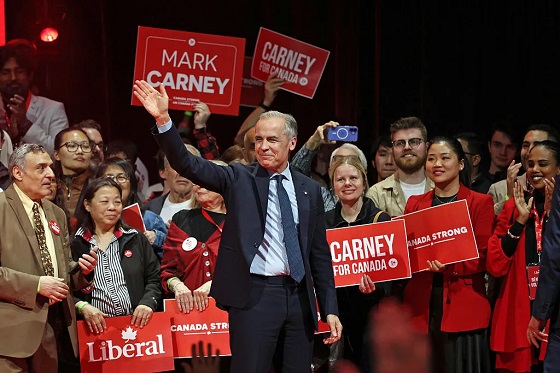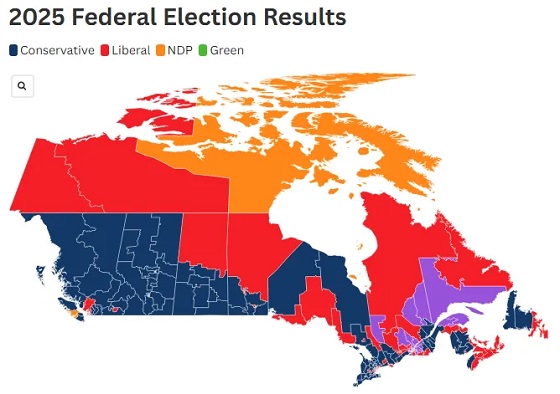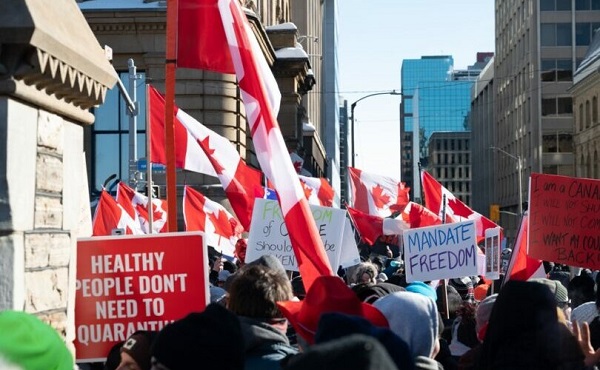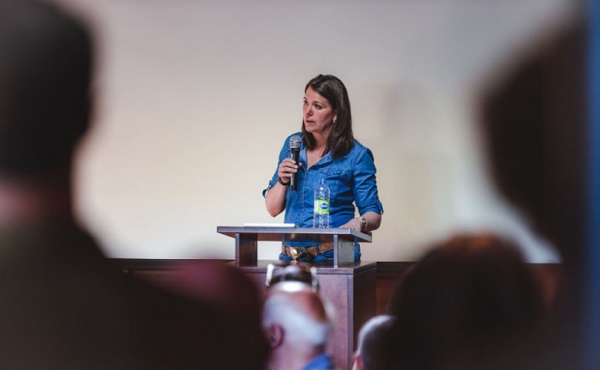Alberta
Big news for Alberta’s students in pandemic update from Minister LaGrange

Helping students catch up after pandemic disruption
As part of Alberta’s Recovery Plan, up to $45 million will support younger students who have fallen behind during the pandemic and more flexibility will be provided for students writing diploma exams.
Supporting reading, writing and numeracy skills for early learners
In May 2021, Alberta’s government announced $45 million would be available for school authorities to offer targeted programming to enhance literacy and numeracy skills.
School authorities have completed learning assessments to identify students who could benefit from targeted programming and now funds will be distributed at a per-student rate of $490.
School authorities have the flexibility to use this funding to design programming to best meet the needs of their students. Programming will be above and beyond classroom learning. The initial focus will be on students in grades 2 and 3, with targeted support for students in Grade 1 starting in February 2022.
“Many Alberta students had their education disrupted during the pandemic, which resulted in lost classroom and instruction time. We are committed to addressing this learning loss, and this funding will support students who need extra help to improve their reading, writing and numeracy skills. This grant gives school authorities the funds and flexibility they need to ensure each student is successful.”
“This $45 million for student learning is welcome news as school boards continue to face a variety of unique challenges due to the pandemic. This will help boards support recovery from long-term effects of learning loss, based on local needs.”
“AISCA is thankful that the Government of Alberta is recognizing and addressing learning disruptions caused by the COVID-19 pandemic. Our association appreciates that the government has taken a proactive approach to remediate and target learning challenges in the early years of a student’s development.”
Diploma exams
In response to feedback from students, parents and education partners about stress and anxiety around academic achievement exams, Alberta Education will temporarily change the weighting of diploma exams to 10 per cent from 30 per cent for the 2021-22 school year.
The ministers of Advanced Education and Education have sent an open letter to Alberta’s post-secondary institutions to advise them of this change and encourage them to further consider the impact the pandemic has had on students who are applying to their post-secondary institutions.
“Alberta’s students continue to face challenges due to the pandemic and I have heard concerns for our graduating class of 2022. I’ve heard feedback from students on my Minister’s Youth Council as well as from education partners that changing the weight of diploma exams will reduce the burden on students while still giving them valuable exam writing experience. We’re making this temporary change in recognition of these circumstances, which we hope will place less of a burden on these students.”
“The College of Alberta School Superintendents is pleased with the Alberta government’s commitment to provide additional funding to support school divisions with addressing Grade 1 to 3 student learning challenges stemming from the pandemic. We’re also grateful for the Minister’s decision to reduce the weighting of diploma exams as it will support Grade 12 students whose learning has also been adversely impacted.”
“As a member of the Minister’s Youth Council, it pleases me to see the Minister taking our feedback and concerns into consideration. As a Grade 12 student, the experience of writing diplomas is essential to prepare us for success as we consider post-secondary. Reducing the weighting of the exams will lessen the impact on mental health in youth while still ensuring that students are motivated to learn and understand the critical value of our education despite the effects of the pandemic.”
At-home rapid tests
Alberta’s government is continuing to use all available tools to stop the spread of COVID-19. Beginning Oct. 27, at-home rapid test kits will be provided to schools with kindergarten to Grade 6 students across the province that are on outbreak status. The program is optional, free, and starts immediately.
Schools will provide the students and staff who wish to participate with 10 tests to take home, and they will be required to test twice weekly for five weeks. Testing regularly ensures testing is most effective. A how-to video for parents and a fact sheet translated into multiple languages offer tips on how to use the kits.
Quick facts
Programming support:
- Of the up to $45 million in learning loss supports, approximately $30 million will be invested now to benefit students in grades 2 and 3. In response to feedback received from school authorities, up to $15 million will be allocated to students in Grade 1 in February 2022.
- With this funding, in grades 2 and 3, approximately 38,000 students will receiving literacy programing and approximately 25,000 will receive numeracy programming, recognizing that some students would qualify for both supports. The number of Grade 1 program opportunities will be available after assessments in the new year.
- Focused programming sessions are intended to be provided for up to 16 weeks. School authorities have the flexibility to design the length and frequency of the programming sessions.
- Funds will be distributed on a per-student basis with a minimum funding amount based on the number of eligible students per school.
At-home rapid tests:
- If a student or staff member has symptoms of COVID-19, they should not use a rapid test. They should stay home and book a test online with the Alberta Health Services (AHS) assessment tool or by calling 811.
- Schools on outbreak must submit a request to Alberta Health to receive tests for this program.
- If a student or staff member has a positive rapid test result, they must isolate for 10 days or until they have a negative test through AHS.
Alberta
Alberta’s future in Canada depends on Carney’s greatest fear: Trump or Climate Change

Oh, Canada
We find it endlessly fascinating that most Canadians believe they live in a representative democracy, where aspiring candidates engage in authentic politicking to earn their place in office. So accustomed are Canada’s power brokers to getting their way, they rarely bother to cover their tracks. A careful reading of the notoriously pliant Canadian press makes anticipating future events in the country surprisingly straightforward.
Back in December, when Pierre Poilievre was given better than 90% odds of replacing Prime Minister Justin Trudeau—and Mark Carney was still just an uncharismatic banker few had heard of—we engaged in some not-so-speculative dot-connecting and correctly predicted Carney’s rise to the top spot. Our interest was driven by the notoriously rocky relationship between Ottawa and the Province of Alberta, home to one of the world’s largest hydrocarbon reserves, and how Carney’s rise might be a catalyst for resetting Canada’s energy trajectory. In a follow-up article titled “The Fix Is In,” we laid out a few more predictions:
“Here’s how the play is likely to unfold in the weeks and months ahead: Carney will be elected Prime Minister on April 28 by a comfortable margin; [Alberta Premier Danielle] Smith will trigger a constitutional crisis, providing cover for Carney to strike a grand bargain that finally resolves longstanding tensions between the provinces and Ottawa; and large infrastructure permitting reform will fall into place. Protests against these developments will be surprisingly muted, and those who do take to the streets will be largely ignored by the media. The entire effort will be wrapped in a thicket of patriotism, with Trump portrayed as a threat even greater than climate change itself. References to carbon emissions will slowly fade…
In parallel, we expect Trump and Carney to swiftly strike a favorable deal on tariffs, padding the latter’s bona fides just as his political capital will be most needed.”
The votes have barely been counted, yet the next moves are already unfolding…
“Alberta Premier Danielle Smith says she’ll make it easier for citizens to initiate a referendum on the province’s future in Canada, after warning that a Liberal win in Monday’s election could spur a groundswell of support for Alberta separatism. Smith said on Tuesday that a newly tabled elections bill will give everyday Albertans a bigger say in the province’s affairs.
‘(We’re giving) Albertans more ways to be directly involved in democracy, and to have their say on issues that matter to them,’ Smith told reporters in Edmonton.
If passed, the new law would dramatically lower the number of signatures needed to put a citizen-proposed constitutional referendum question on the ballot, setting a new threshold of 10 per cent of general election turnout — or just over 175,000, based on Alberta’s last provincial election in 2023.”
“US President Donald Trump said on Wednesday that Canadian Prime Minister Mark Carney is looking to make a trade deal and will visit the White House within the next week. Trump said he congratulated Carney on his election victory when the Canadian leader called on Tuesday.
‘He called me up yesterday – he said let’s make a deal,’ Trump told reporters at the White House after a televised Cabinet meeting.”
Remember where you read it first.
Alberta
Preston Manning: Canada is in a unity crisis

 Preston Manning
Preston Manning
A Canada West Assembly would investigate why
The election of a minority Liberal government on Monday, and the strong showing of the Conservative party under Pierre Poilievre, cannot mask the fact that Canada remains seriously fractured on many fronts. Thus, one of the primary tasks of the Carney government will be to unite us for the sake of our own national well-being — not simply for the sake of presenting a strong front in future dealings with the United States.
But how is that to be done? When parliament meets as scheduled on May 26, will the government’s throne speech acknowledge the main sources of national disunity and propose the immediate adoption of remedial measures? Or will it ignore the problem entirely, which will serve to further alienate Quebec and the West from Ottawa and the rest of Canada, and weaken Canada’s bargaining position vis a vis the United States?
The principal tactic employed by the Liberal party to unite Canadians behind it in the recent election was to employ the politics of fear — fear of U.S. President Donald Trump trying to “break us so that America can own us,” as Liberal Leader Mark Carney has repeatedly said.
But if the only way to unite Canadians is through the promotion of anti-Americanism fostered by fear of some alleged American takeover — if reaction to the erratic musings of an American president is the only way to motivate more Canadians to vote in a federal election — then not only national unity, but Canadian democracy itself, is in critical condition.
We need to pinpoint what actually is fracturing the country, because if we can clearly define that, we can begin the process of removing those divisive elements to the largest extent possible. Carney and the Liberals will of course declare that it is separatist agitations in Quebec and now the West that is dividing us, but these are simply symptoms of the problem, not the cause.
Here, then, is a partial list of what underpins the division and disunity in this country and, more importantly, of some positive, achievable actions we can take to reduce or eliminate them.
First and foremost is the failure to recognize and accommodate the regional character of this country. Canada is the second-largest country by area on the planet and is characterized by huge geographic regions — the Atlantic, Central Canada, the Prairies, the Pacific Coast and the Northern territories.
Each of these regions — not just Quebec — has its own “distinctive” concerns and aspirations, which must be officially recognized and addressed by the federal government if the country is to be truly united. The previous Liberal government consistently failed to do this, particularly with respect to the Prairies, Pacific and Northern regions, which is the root of much of the alienation that even stimulates talk of western separation.
Second is Ottawa’s failure to recognize and treat the natural resources sector as a fundamental building block of our national economy — not as a relic from the past or an environmental liability, as it was regarded by the government of former prime minister Justin Trudeau.
Will the throne speech announce another 180-degree turn for the Liberal government: the explicit recognition that the great engine of the Canadian economy and our economic recovery is not the federal government, as Carney has implied, but Canada’s agricultural, energy, mining, forestry and fishery sectors, with all the processing, servicing, manufacturing and knowledge sectors that are built upon them?
A third issue we’ve been plagued with is the division of Canadian society based on race, gender, sexual preferences and other identity traits, rather than focusing on the things that unite us as a nation, such as the equality of all under the law. Many private-sector entities are beginning to see the folly of pursuing identity initiatives such as diversity, equity and inclusion that divide rather than unite, but will the Liberal government follow suit and will that intention be made crystal clear in the upcoming throne speech?
A final issue is the federal government’s intrusion into areas of provincial jurisdiction — such as natural resources, health, municipal governance, along with property and civil rights — which is the principal cause of tension and conflict between the federal and provincial governments.
The solution is to pass a federal “act respecting provincial jurisdiction” to repeal or amend the statutes that authorize federal intrusions, so as to eliminate, or at least reduce, their intrusiveness. Coincidentally, this would be a legislative measure that both the Conservatives and the Bloc could unite behind if such a statute were to be one of the first pieces of legislation introduced by the Carney government.
Polling is currently being done to ascertain whether the election of yet another Liberal government has increased the growing estrangement of western Canada from Ottawa and the rest of Canada, notwithstanding Carney’s assurances that his minority government will change its policies on climate change, pipelines, immigration, deficit spending and other distinguishing characteristics of the discredited Trudeau government.
The first test of the truthfulness of those assurances will come via the speech from the throne and the follow-up actions of the federal government.
Meanwhile, consultations are being held on the merits and means of organizing a “Canada West Assembly” to provide a democratic forum for the presentation, analysis and debate of the options facing western Canada (not just Alberta) — from acceptance of a fairer and stronger position within the federation based on guarantees from the federal government, to various independence-oriented proposals, with votes to be taken on the various options and recommendations to be made to the affected provincial governments.
Only time will tell whether the newly elected Carney government chooses to address the root causes of national disunity. But whether it does so or not will influence the direction in which the western provinces and the proposed Canada West Assembly will point.
Preston’s Substack is free today.
But if you enjoyed this post, you can tell Preston’s Substack that their writing is valuable by pledging a future subscription.
-

 Banks2 days ago
Banks2 days agoTD Bank Account Closures Expose Chinese Hybrid Warfare Threat
-

 2025 Federal Election2 days ago
2025 Federal Election2 days agoPost election…the chips fell where they fell
-

 Alberta2 days ago
Alberta2 days agoNew Alberta Election Act bans electronic vote counting machines, lowers threshold for recalls and petitions
-

 Alberta2 days ago
Alberta2 days agoHours after Liberal election win, Alberta Prosperity Project drumming up interest in referendum
-

 COVID-192 days ago
COVID-192 days agoFreedom Convoy leaders’ sentencing judgment delayed, Crown wants them jailed for two years
-

 espionage1 day ago
espionage1 day agoLongtime Liberal MP Warns of Existential Threat to Canada, Suggests Trump’s ’51st State’ Jibes Boosted Carney
-

 Alberta1 day ago
Alberta1 day agoPremier Danielle Smith hints Alberta may begin ‘path’ toward greater autonomy after Mark Carney’s win
-

 Duane Rolheiser2 days ago
Duane Rolheiser2 days agoCarney Wins: What now Alberta?







